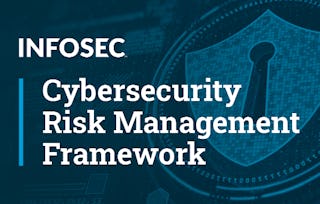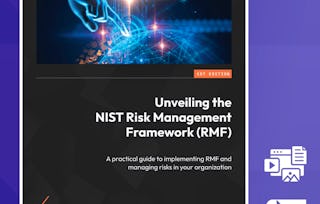The Risk Management Framework (RMF) provides a disciplined, structured and flexible process for managing security and privacy risk. It includes information security categorization; control selection, implementation and assessment; system and common control authorizations; and continuous monitoring. It includes activities to prepare organizations to execute the framework at appropriate risk management levels. This learning path explains the RMF steps and its processes (aka tasks) which link essential risk management processes at the system level to risk management processes at the organization level. This learning path explains the Risk Management Framework (RMF) and its processes and provides guidance for applying the RMF to information systems and organizations.

Ends soon: Gain next-level skills with Coursera Plus for $199 (regularly $399). Save now.

NIST DoD RMF
This course is part of Cybersecurity Risk Management Framework Specialization

Instructor: Ross Casanova
4,016 already enrolled
Included with
(51 reviews)
Skills you'll gain
Details to know

Add to your LinkedIn profile
1 assignment
See how employees at top companies are mastering in-demand skills

Build your subject-matter expertise
- Learn new concepts from industry experts
- Gain a foundational understanding of a subject or tool
- Develop job-relevant skills with hands-on projects
- Earn a shareable career certificate

There are 5 modules in this course
This course provides an introduction to the National Institute of Standards and Technology (NIST) Risk Management Framework (RMF) Skills course. In this course, we will teach you how to employ the Risk Management Framework to better manage and reduce cybersecurity risks. In this module, we provide a brief overview, and then detail the involvement of some regulatory organizations in the development and execution of the NIST RMF. We specifically discuss executive orders, NIST, the Office of Management and Budget, the Committee on National Security Systems and more.
What's included
2 videos
In this module, we explain some of the laws, policies and regulations which mandate the implementation of the NIST RMF and govern the execution of the NIST RMF. This module discusses the Privacy Act, the Computer Fraud and Abuse Act, the USA PATRIOT Act and more.
What's included
1 video
In this module, we describe the basic concepts associated with managing information system-related security and privacy risk in organizations. Managing information system-related security and privacy risk is a complex undertaking that requires the involvement of the entire organization. Risk management is a holistic activity that affects every aspect of the organization and cannot be made in isolation. This module discusses risk, the system development life cycle, key roles and more.
What's included
4 videos
In this module, we discuss the NIST RMF steps. describes the RMF and provides guidelines for applying it to information systems and organizations. We discuss the RMF structured and flexible process for managing security and privacy risk, as well as RMF activities to prepare organizations to execute the framework at appropriate risk management levels.
What's included
7 videos
In this module, we review the six RMF steps: Categorize/Identify; Select; Implement; Assess; Authorize; and Monitor and provide an assessment to gauge your understanding of the course. In addition, there is a project in which you will review the categorization process by completing the NIST 800-60v1 categorization worksheet. You will then transfer the information over to the FIPS 199 Categorization Form and look at the six RMF steps.
What's included
2 videos5 readings1 assignment
Earn a career certificate
Add this credential to your LinkedIn profile, resume, or CV. Share it on social media and in your performance review.
Instructor

Offered by
Explore more from Security
 Status: Free Trial
Status: Free Trial Status: Free Trial
Status: Free Trial
Why people choose Coursera for their career




Frequently asked questions
To access the course materials, assignments and to earn a Certificate, you will need to purchase the Certificate experience when you enroll in a course. You can try a Free Trial instead, or apply for Financial Aid. The course may offer 'Full Course, No Certificate' instead. This option lets you see all course materials, submit required assessments, and get a final grade. This also means that you will not be able to purchase a Certificate experience.
When you enroll in the course, you get access to all of the courses in the Specialization, and you earn a certificate when you complete the work. Your electronic Certificate will be added to your Accomplishments page - from there, you can print your Certificate or add it to your LinkedIn profile.
Yes. In select learning programs, you can apply for financial aid or a scholarship if you can’t afford the enrollment fee. If fin aid or scholarship is available for your learning program selection, you’ll find a link to apply on the description page.
More questions
Financial aid available,







